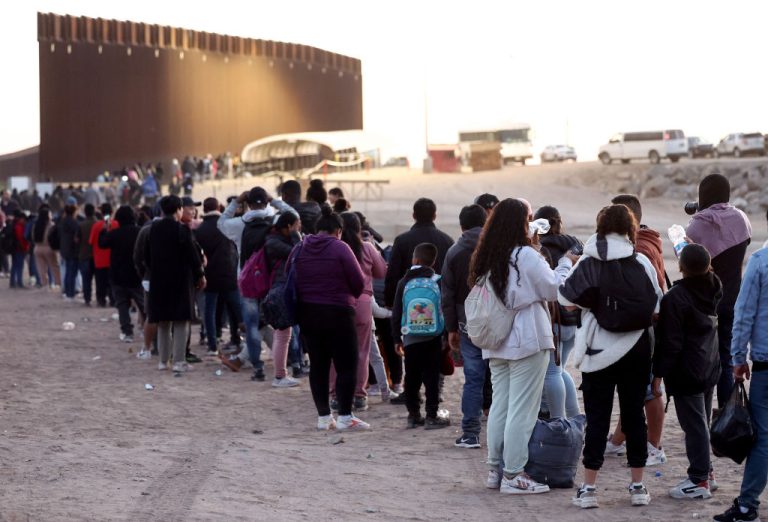According to a Quinnipiac University poll, published on Dec. 6, 85 percent of voting New Yorkers are either very concerned or somewhat concerned that the city will be unable to accommodate the growing number of migrants arriving in the sanctuary city.
In addition, a large majority of those polled, 62 percent, agree with New York City mayor Eric Adams’ past remarks that the migrant crisis will “destroy” New York City.
The embattled mayor has been lobbying the federal government for months for more support to address the growing crisis and his constituents agree with this route. Some 80 percent of respondents say that the Biden administration needs to do more where only eight percent said the federal government was doing enough while six percent said it is doing too much.
In a statement, Quinnipiac University Poll Assistant Director, Mary Snow said, “In a city where the words ‘Give me you tired, your poor, your huddled masses yearning to breathe free’ are embedded in its history, voters express there’s a limit.”
“An overwhelming number of them worry the city doesn’t have the capacity to welcome the surge of migrants that have been arriving in New York since the spring of 2022. And they near unanimously agree that the federal government isn’t doing enough to help New York City,” she wrote.
READ MORE:
- High Rental Costs Worsened US Consumer Inflation in November
- NY: Organized Retail Theft Costs Businesses Billions as NYPD Exodus Continues
- Support for Trump Grows as Biden’s Approval Drops, WSJ Survey Finds
$140 million in federal funding
Success
You are now signed up for our newsletter
Success
Check your email to complete sign up
So far, New York City has received roughly $140 million in federal funding to address the crisis, more than any other city not on the southern border, however it is a far cry from the estimated $12 billion it will cost the city by the summer of 2025.
In August, the federal government told New York State Governor, Kathy Hochul, that more funds are not on the way while blaming congressional hurdles.
Also in August, Mayor Adams said that “The immigration system in this nation is broken; it has been broken for decades. Today, New York City has been left to pick up the pieces.”
Despite this, Hizzoner vowed not to deny migrants shelter, as the city is legally required to provide beds and care in a timely manner under its “Right to Shelter” law.
While little help is coming from the federal government, the state, in its recent budget, has allocated $1 billion toward housing, National Guard assistance and legal services for migrants in the city.
Hochul said that she is speaking with state leaders to secure an additional $1 billion in the next budget.
READ MORE:
- Moody’s Lowers Outlook on China’s Credit Rating, Citing Increased Debt Risks
- Childhood Pneumonia Cases in China on the Rise: What We Know So Far
- Soaring Number of Chinese Nationals Arrested at US Southern Border as Communist Party Intensifies Oppression
Cities scramble
Not only New York, but other cities are buckling under the weight of a steady stream of asylum seekers, and are now struggling to house as many as possible as the cold winter weather has set in.
In Chicago, migrants fill police station floors to escape the cold, and in Massachusetts, the state is converting vacant office space into shelters while local charities stockpile sleeping bags.
In New York, the situation has become so dire that the city has taken the extraordinary step of providing plane tickets to Morocco for some migrants and has even considered distributing tents to new arrivals so they can sleep in parks.
New York City, which by the end of November was housing more than 65,600 migrants, recently issued 60-day notices to families with children, telling them they have to find their own accommodations, while single adults were given 30-days notice to find accommodations outside the city’s shelter system.
In a statement in late November, Kayla Mamelak Altus, an Adams’ spokesperson said, “As the temperature starts to drop, it is crucial — now more than ever — that the federal government finish the job they started. We need meaningful financial help and a national decompression strategy. New York City cannot continue to manage a national crisis almost entirely on its own.”
There are concerns that the existing facilities, like the tent complex erected at Floyd Bennett Field, may not make it through the winter.
Executive director of the New York Immigration Coalition, Murad Awawdeh, said recent flooding at some sites has created unhealthy living conditions and that the city needs to find a more permanent solution.
“I think for us it really is everything coming to bear at a time when the weather is really cold,” Awawdeh told POLITICO.
















